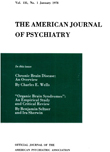GENETIC FACTORS IN SCHIZOPHRENIA
Abstract
It is generally accepted that intelligence in the general population, and high-grade mental deficiency, are largely determined by the cumulative effects of polygenes. Simple Mendelian inheritance is well established as causative of certain forms of (usually) low-grade mental deficiency, and other degenerations involving the central nervous system, including Huntington's chorea.
There is still considerable doubt concerning the significance of genetic factors in the etiology of "functional" psychiatric disorders. Schizophrenia has been extensively studied by means of twin and family data, but the extent and nature of possible genetic factors in this syndrome remain uncertain.
Twin studies suggest that heredity may be slightly more important in predisposing to schizophrenia than in determining intelligence, but these studies are complicated by very serious methodological difficulties, some of which have been discussed.
The frequency of schizophrenia is significantly greater in families of schizophrenics than in the general population, but observed frequencies in different classes of relatives do not conform with those expected on the basis of simple Mendelian dominance or recessivity.
Expected frequencies in various classes of relatives have been examined under each of three hypotheses involving incomplete penetrance and/or expressivity (in homozygote and/or heterozygote). Data on consanguinity, assortative mating, mortality and fertility have been outlined.
It has been concluded that no monogenic hypothesis is compatible with all the data recorded, and three alternatives (that are not mutually exclusive) have been briefly considered: 1. Predominantly environmental causation, 2. Genetic heterogeneity, 3. Polygenic inheritance.
Statistical associations between schizophrenia and limited intelligence, inferior socio-economic status, maternal mortality, and immunological or other somatic characteristics of schizophrenics, are all compatible with the latter hypotheses.
The data recorded on schizophrenia are complex and do not conform with any simple genetic hypothesis. Pending the results of considerable further investigation, theories concerning the role of possible genetic factors in the development of schizophrenia and other "functional" psychiatric disorders will remain in the realm of speculation.
Access content
To read the fulltext, please use one of the options below to sign in or purchase access.- Personal login
- Institutional Login
- Sign in via OpenAthens
- Register for access
-
Please login/register if you wish to pair your device and check access availability.
Not a subscriber?
PsychiatryOnline subscription options offer access to the DSM-5 library, books, journals, CME, and patient resources. This all-in-one virtual library provides psychiatrists and mental health professionals with key resources for diagnosis, treatment, research, and professional development.
Need more help? PsychiatryOnline Customer Service may be reached by emailing [email protected] or by calling 800-368-5777 (in the U.S.) or 703-907-7322 (outside the U.S.).



